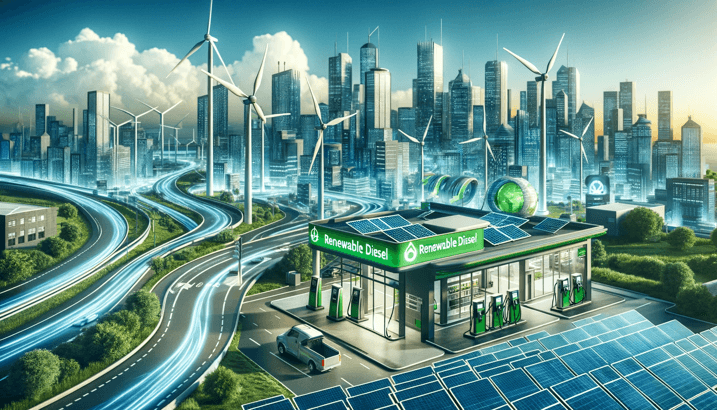DIY Renewable Diesel: Can it be a Reality?
The quest for sustainable energy solutions has led many to explore the potential of renewable diesel. This alternative fuel source, distinct from traditional biodiesel, is made through a process that converts natural fats, oils, and greases into hydrocarbons.
The result is a cleaner-burning fuel that significantly reduces emissions compared to conventional diesel. But could this green fuel be produced on a smaller scale, like at home or within local communities? Let’s delve into the feasibility of DIY renewable diesel and examine its potential to revolutionize our energy landscape.
The Basics of Renewable Diesel Production
Renewable diesel production involves complex chemical processes, including hydrotreating, isomerization, and hydrocracking. These processes remove contaminants and convert triglycerides into hydrocarbons that mimic the molecular structure of petroleum-based diesel.
For large-scale producers, such as Neste, this process is streamlined through sophisticated technology and infrastructure designed to handle vast quantities of raw materials efficiently.
Challenges of Scaling Down
When considering the adaptation of this process for home or community use, several significant challenges emerge. Firstly, the equipment required for hydrotreating and other processes is industrial in scale and cost, making it prohibitive for small-scale operations.
Moreover, managing the chemical reactions safely requires expertise in chemical engineering and access to specialized safety equipment.
Safety and Regulation
Safety concerns are paramount when dealing with the high temperatures and pressures needed for renewable diesel production. At an industrial scale, companies operate under strict regulations with comprehensive safety protocols.
Replicating these conditions in a less controlled environment poses considerable risks, including potential chemical spills, explosions, and exposure to toxic substances.
Quality Control and Engine Compatibility
Producing renewable diesel that meets the strict standards required for engine compatibility is another hurdle.
Engine manufacturers approve fuels like Neste’s renewable diesel because they consistently meet these high-quality standards. Small-scale production runs the risk of variable fuel quality, which could damage engines or void warranties.
Environmental and Economic Implications
The environmental benefits of renewable diesel are clear, offering a significant reduction in greenhouse gas emissions compared to fossil fuels. However, the sustainability of DIY production is questionable. Efficiently collecting and processing the necessary raw materials on a small scale without negating the environmental benefits poses a logistical challenge.
Economically, the initial investment for the necessary equipment and ongoing operational costs could outweigh the potential savings on fuel.
The Case for Commercial Renewable Diesel
Given these challenges, it’s clear that DIY renewable diesel production is not a feasible option for individuals or local communities. Instead, the focus should be on supporting and utilizing commercially produced renewable diesel from trusted suppliers like Neste.
Neste’s renewable diesel is not only produced safely and sustainably but also meets the quality standards required by engine manufacturers. By choosing Neste Renewable Diesel, consumers can contribute to reducing emissions without the risks and challenges associated with DIY production.
Final Thoughts
The dream of producing renewable diesel on a small scale is an admirable one, driven by a desire for sustainable and decentralized energy solutions.
However, the realities of the production process and the importance of quality and safety standards make it an impractical choice for individuals and communities. Instead, supporting the use of commercially produced renewable diesel offers a viable path to reducing our carbon footprint and transitioning to cleaner energy sources.
Neste Renewable Diesel stands out as a leading choice, approved by engine makers and designed for a sustainable future. By choosing trusted, high-quality fuels, we can drive forward on the road to environmental responsibility and energy independence.


